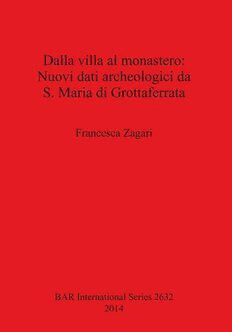
Dalla villa al monastero: Nuovi dati archeologici da S. Maria di Grottaferrata PDF
199 Pages·2014·15.222 MB·Italian
Most books are stored in the elastic cloud where traffic is expensive. For this reason, we have a limit on daily download.
Preview Dalla villa al monastero: Nuovi dati archeologici da S. Maria di Grottaferrata
Description:
This monograph presents the results of the first planned archaeological excavations in the important Italo-Greek Abbey of Grottaferrata that was founded near Rome by St. Nilus of Rossano in 1004 over the ruins of a grand Roman villa. The research focuses on the transformation of the settlement and on the social, economic and cultural dynamics from Late Antiquity to the Renaissance and it has revealed the existence of previously unknown Late Antique and Early Medieval sites. Pottery vessels made in Rome and in Southern Italy in the 11th-12th centuries and walls made of Roman spolia belonged to St. Nilus' monastery. The monastery of that time had a church, a dormitory and a sort of borgo with agricultural workers' dwellings, stables and warehouses. Archaeological research has also shed light on the works commissioned by Commendatory Abbots between the 15th and 18th centuries. The important results of this Research Project were also thanks to the possibility of comparing the data of Grottaferrata with those that came from the first archaeological excavations recently undertaken in Italo-Greek monasteries in Southern Italy.
See more
The list of books you might like
Most books are stored in the elastic cloud where traffic is expensive. For this reason, we have a limit on daily download.
